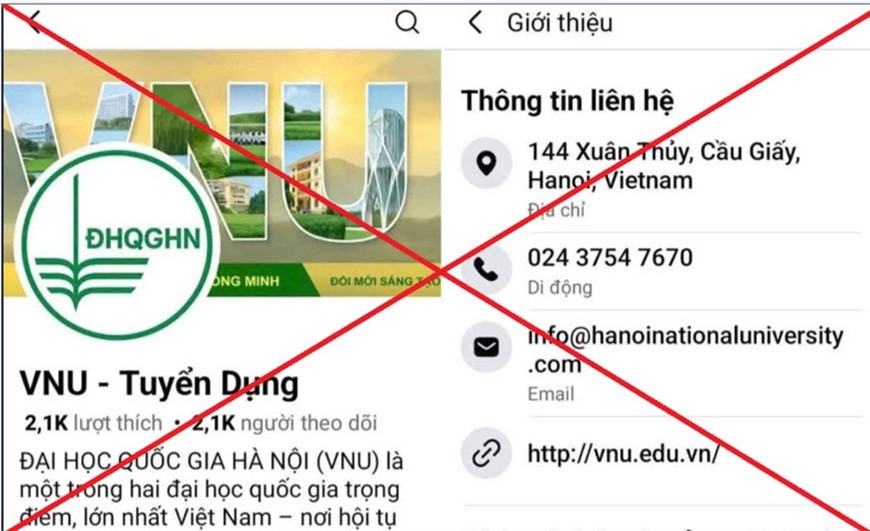Taking advantage of the impatience and inexperience of young people, they set up a series of fake websites, fanpages and emails of companies, even large universities, to appropriate property. By sending "successful" invitation letters with attractive salaries, the subjects asked candidates to provide personal information or transfer money under many reasons: application fees, uniform fees, interview reservation fees... Many young people have fallen into the trap, lost money but no job.

Recently, Hanoi National University (VNU) has recorded a number of fake social networking sites using the name "VNU-Recruitment", logos, and images related to VNU to entice users to provide personal information and transfer money with attractive recruitment invitations for teaching assistant and specialist positions at the school. The subjects contacted via email, text messages, social networks, and then asked to pay admission fees and program participation fees. The school representative said that this is a fraudulent method, negatively affecting the school's reputation and causing direct damage to the people. If there is recruitment, the school does not ask candidates to pay money at any stage of the recruitment process. Hoang Thi Oanh, a first-year student majoring in public administration at the Hanoi University of Business and Technology, shared: “Because I wanted to find a part-time job, I was invited to apply for a social security project under the name of the National University. After that, they guided me to receive the assignment and asked me to transfer an advance payment to participate in the project. Luckily, I asked my teachers and was warned, otherwise I would have lost money...”.
Mr. Vu Ngoc Son, Head of Technology Department, Association Cybersecurity The country said: “A common trick of scammers is to create fake websites by copying images and content from official sites, then registering similar domain names to deceive candidates. This copying creates initial trust, thereby leading victims to follow a pre-made scam scenario. The jobs offered often have high salaries, while the job descriptions are very vague. Accompanying them is a link to download the application or a personal information declaration form, which is essentially intended to defraud financially or spread malware. Another common point is that the subjects ask victims to join closed groups on social networks. Here, they arrange “fake candidates” to juggle to create trust, then pressure victims to transfer money with the reason “the application deadline is almost over” or “if you don’t deposit, you will lose your place”. Students absolutely do not install applications from strange links or QR codes; need to carefully verify information of the recruiting unit through the official website or call directly”.
Source: https://baolangson.vn/canh-giac-voi-bay-tuyen-dung-online-5060037.html







![[Photo] Prime Minister Pham Minh Chinh attends the groundbreaking ceremony of two key projects in Hai Phong city](https://vphoto.vietnam.vn/thumb/1200x675/vietnam/resource/IMAGE/2025/9/27/6adba56d5d94403093a074ac6496ec9d)


























































































Comment (0)